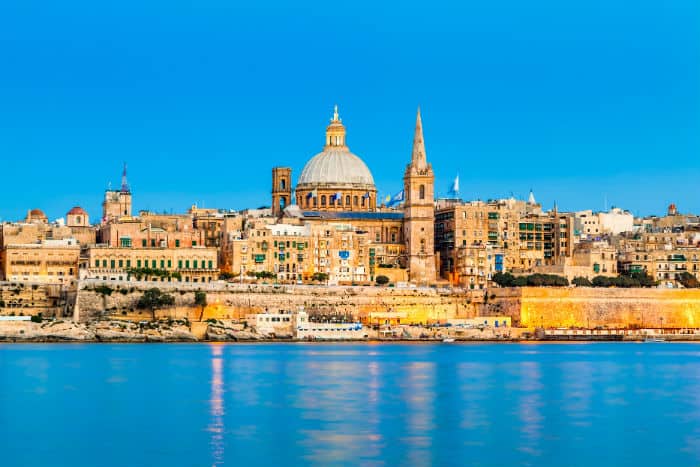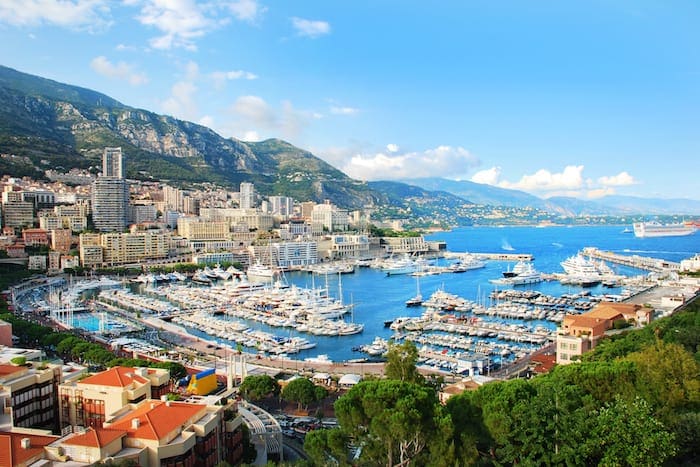12 European Countries with the Lowest Taxes: 2025 Tax Guide
June 16, 2025
Ever dreamed of living in Europe? You’re not alone.
The problem is that the continent’s traditionally high tax rates have turned many successful entrepreneurs and investors away from Europe, forcing them to explore zero-tax options in the Caribbean, the Middle East or the Pacific Ocean.
But that doesn’t have to be the case. You don’t have to leave Europe for the Bahamas or Dubai to enjoy low tax rates. As long as you’re willing to invest some of your money and, potentially, time, there are some very tax-friendly European countries to call home.
For example, did you know that paying as little as 10% in personal income tax and 9% in corporate tax is possible in Europe?
It is.
Now, we’re not claiming that finding this kind of deal in Europe is simple because it’s not. But it’s possible. And if you’re interested in learning more about this kind of European option, then Nomad Capitalist can take care of everything on your behalf.
Live in European Countries with Low Taxes
Here’s the deal – living in Europe and paying low-income taxes is no mean feat.
However, it’s achievable, and you don’t even have to live like a digital nomad to accomplish it.
Sure, it’s possible to spend the three summer months living in Europe, then winter and autumn further south in the Balkans or the other side of the world in Latin America.
However, a recurring theme among the seven- and eight-figure business owners we work with is the desire for a place to call home.
Many successful entrepreneurs and investors desire a full-time home combined with minimal taxation instead of dragging a suitcase around the world.
That’s achievable in Europe, even if you want to combine it with low taxes.
While some European countries like France will always be off-limits to those seeking excellent tax planning, we’ve done the legwork on your behalf and identified 12 Euro countries – listed below – that are low-tax alternatives worth considering.
What Are the Best Low-Tax Countries to Live in Europe?
1. Andorra: Low-Tax Haven in the Pyrenees Mountains

Pressure from the European Union (EU) pushed Andorra to implement its first-ever income tax in 2015. However, Andorra still remains a low-tax haven conveniently nestled between high-tax Spain and France.
Renowned as a destination for duty-free shopping, Andorra is an idyllic mountainous country offering residence permits to investors and business owners. It’s positioned itself to attract individuals who are of more average means than those courted by some other low-tax countries, such as Monaco.
Andorra is an ideal destination for individuals with capital gains or generational wealth, as it has no wealth tax, gift tax or inheritance tax. The only capital gains tax is levied on most sales of Andorran real estate. Income tax has a generous €24,000 exemption and reaches its top 10% tax rate only after €40,000.
Unless you’re accomplished in your field, there are several categories through which you can qualify for tax residence, including making an investment or starting a company.
You’ll need to commit to spending 90 days per year being a tax resident of Andorra, renting or owning a property, maintaining a bond and maintaining health insurance. Many tax residents are exempt from paying already low taxes depending on how their income is earned.
Going down the route of starting a company requires far less upfront capital – a deposit of €50,000. Still, you do need to actually run a business, which means living in Andorra should be part of your overall corporate and tax strategy.
If you prefer to become a passive resident – neither working nor incorporating a business in the country – you can invest €600,000 in Andorra. This avenue includes investment in real estate.
Alternatively, Andorra’s active residency , self-employment program, requires a deposit of €15,000. It’s aimed at entrepreneurs who want to take up full-time residence for more than six months a year there. The main caveat is that you must own a company in Andorra before applying.
2. Hungary: Lowest Corporate Tax Rates in Europe

Hungary has a standard personal income tax rate of just 15% and a corporate tax rate of 9%, making it one of Europe’s most reasonable and tax-friendly jurisdictions.
Dividends, capital gains and interest are taxed at a fixed rate of 15%, with a maximum annual social contribution of around €2,000.
To qualify as a tax resident, you must either spend 183 or more days in Hungary within a calendar year or have a permanent home there.
Alternatively, your centre of interest must be in the territory if you have multiple homes in various countries, including Hungary.
Although Hungary offers low corporate and reasonable personal income tax, it is less immigration-friendly compared to many of its fellow EU member states.
That said, Hungary relaunched its Golden Visa program in 2024 under a new name called the Guest Investor Visa , which offers investors the right to live and work in the country for ten years. There are three options to obtain the Guest Investor Residence permit:
● Invest €250,000 in a government-approved investment fund for at least five years
● Invest €500,000 in Hungarian residential real estate
● Donate a non-refundable €1 million to an institution involved in scientific research or artistic activities.
3. Bulgaria: Second-Lowest Corporate Taxes in Europe

Bulgaria’s corporate tax rate is 10% , the second-lowest corporate tax rate in the EU after Hungary. This eastern European nation also maintains tax treaties with many countries, which could allow for special tax treatment for some international entrepreneurs.
To establish temporary or permanent residence in Bulgaria, you have a number of options, including:
- Investing a minimum €312,000 in real estate
- Starting a company and investing around €256,000
- Investing about €3,068,000 in a Bulgarian business (whose shares are not traded on a regulated market).
Bulgaria’s tax system is simple: live there and pay taxes at just 10%.
You can become a tax resident in Bulgaria either by living there for at least 183 days a year or by proving that Bulgaria is your ‘centre of life’ to the tax office.
While merely staying in the country is often easier, the ‘centre of life’ test gives you more flexibility. Eastern Europe is one of the world’s most underrated regions , and some prefer living in Serbia or Romania when it comes to the Balkans.
4. Czech Republic: Prague Residency with Massive Tax Advantages

The Czech Republic is often ignored as a low-tax jurisdiction despite its streamlined personal income tax rates and corporate tax rates, which are some of the most reasonable in Europe.
The Czech Republic has long been an attractive relocation destination for foreigners. Prague, in particular, regularly appears on lists of the best European cities.
As a low-tax residence option, the Czech Republic is best suited for EU citizens.
That’s because self-employed Europeans can not only avail themselves of a 15% flat tax rate but may also apply a lump sum tax deduction in lieu of actual expenses.
For most business owners, the lump sum can reduce the flat tax by 40% or 60%, leaving an effective tax rate of 6% to 9% on self-employed entrepreneurs.
5. Georgia: Live Tax-Free with a Micro Business

While Georgia may not be in the centre of Europe, its position in the Caucasus places it squarely between Eastern Europe and Asia.
All personal income is subject to a flat tax rate of 20% in Georgia . However, under a special tax regime, those with an annual turnover of less than 30,000 Georgian lari (GEL), (around US$11,000) who register as a micro business with no employees are not taxed on their business income.
Not all business sectors qualify for this but, if yours does then, you can apply for a small business certificate and pay 1% of the income .
If you exceed the 500 000 GEL limit, you can still claim small business status if you stay within the income threshold for two consecutive years. In addition, residents here are not taxed on their worldwide income, which includes domestic and international.
So, it’s easy to create an international structure and pay very low corporate tax while being a legal resident of Georgia. It’s also possible to maintain a part-time home base in Georgia without incurring tax obligations.
6. Gibraltar: Low-Tax British Territory

Gibraltar has been a popular choice for British citizens seeking a low-tax residency but it’s not just open to Brits – Gibraltar’s tax benefits are available to everyone.
Nestled at the southern tip of the Iberian Peninsula, bordering Spain to the north, Gibraltar is a British Overseas Territory which means that, as a sovereign country, it’s able to set its own tax policies.
Gibraltar has an oddly progressive but then regressive income tax system, with rates in its Gross Income Based System (GIBS) ranging from 6% to 28% .
There are two ways to become a resident in Gibraltar: start a company or demonstrate a high net worth. As is usually the case with these programs, it is easier for entrepreneurs to qualify by forming a company, but for most proving wealth is easier in the long run.
The High Executive Possessing Specialist Skills method, or HEPSS, allows executives in Gibraltar companies to pay a maximum tax on their salary.
With the HEPSS, you must earn more than GB£120,000 per year to be eligible and the tax liability is limited to the first GB£160,000 of your salary – which currently equates to a total tax charge of GB£39,940.
The Category 2 visa program is also appealing but requires a net worth of £2 million (US$2.5 million) to qualify. There are few requirements besides proving this level of wealth – the main requirement being to purchase or lease a ‘qualifying’ home.
Under the Category 2 visa, individuals are only liable to pay income tax on the first GB£118,000 of their annual worldwide income under the Allowances Based System.
Annual tax payable here ranges from between GB£37,000 to GB£44,740.
7. Malta: Residence Programs with Minimal Taxes

The tiny island nation of Malta is a member of both the Schengen Area and the EU and has developed some of the EU’s most tax-friendly programs.
These are suitable for both individual tax residents and corporations, with corporate tax rates as low as 5% possible for non-resident companies.
Malta offers two different tax residence options:
As a non-domiciled Malta tax resident, you only pay tax on income earned or remitted there.
Malta’s residence program options are discussed in this detailed guide.
Maltese tax residents are not subject to tax in Malta on foreign-sourced income that is kept outside of the country. What’s more, they’re not subject to tax on foreign capital gains even if those gains are sent to a Maltese bank account.
Other income, including pensions, can be taxed once at a flat 15% thanks to Malta’s tax treaty network. The cost of maintaining tax residence in Malta is a flat €15,000 ‘minimum tax’ payable each year. With proper planning, this should also be the maximum tax.
8. Monaco: 0% Income Tax in the Heart of Europe

While Monaco is not a full member of the EU, it is a de facto participant in the borderless Schengen Area, offering excellent travel opportunities.
The country’s exclusivity and proximity to France and the rest of Europe make it a more desirable tax residency than other isolated zero-tax countries .
Monaco’s personal income tax still stands at 0%, while its corporate income tax is now set at 25%.
However, tax residence in Monaco is reserved for only the wealthiest entrepreneurs and investors. You’ll need at least a €500,000 bank deposit and purchase (or, in some cases, rental) of a property there.
It’s also reserved for those actually willing to live there: a tax resident is required to spend 183 days per year for the first nine years, at which point they can obtain what is effectively permanent residence.
If you’re interested, read more in our guide to Monaco residency and citizenship.
9. Montenegro: 9 – 15% Tax Rates in Paradise

Montenegro boasts one of the lowest personal income tax and corporate income tax rates in Europe, at progressive rates from 9 – 15%.
Like many of its western Balkan neighbours, Montenegro has sought to attract business by lowering tax rates. While almost all of Eastern Europe offers rather reasonable tax rates, Montenegro has the added distinction of being stunning place to visit during the summer season.
The country allows foreigners who buy residential property to obtain temporary residence, which is renewable yearly.
Though Montenegro isn’t a zero-tax country for full-time residents, it is a very attractive base, primarily for Europeans seeking a legitimate low-tax residence.
10. Portugal: 20% Flat Tax for Foreign Professionals

Most people don’t associate Portugal with low taxes. In most cases, they’re right; Portugal is hardly tax favourable for the average resident. The country’s taxes vary from 13.25% to 48% on personal income.
Expats had been able to take advantage of a ten-year Non-Habitual Resident (NHR) program that exempted up to 100% of their income from Portuguese tax. However, for political reasons, namely a housing crisis and rising inflation, Portugal has changed the NHR tax regime.
The changes mean that Portugal is no longer accepting NHR applications , and those who become tax residents in Portugal in 2024 will no longer be eligible to register.
However, a new tax incentive for research and innovation has been created for 2024: the Tax Incentive Scheme for Scientific Research and Innovation (IFICI).
This new regime, sometimes referred to as NHR 2.0, aims to attract individuals involved in specific professions such as teaching, scientific research and other high-tech or innovation-led fields.
Key features include a flat rate tax of 20% on professional income generated in Portugal and a wide-ranging exemption on most foreign-sourced income, provided it may be taxed in the source country under a Double Taxation Agreement (DTA).
Like the original NHR scheme, it’s designed for a 10-year duration.
To qualify, applicants must not have been tax residents in Portugal for the preceding five years, can’t have benefited from the former NHR scheme and must be involved in one of the specified eligible activities.
11. Switzerland: Lump-Sum Taxation

Switzerland is one of the safest and most respected countries in the world, located at the heart of Europe.
While Switzerland is hardly a cheap place to live, it has one of the highest standards of living in the world and its maximum personal income tax rate is only 11.5% .
Swiss residency offers an air of legitimacy that many other low-tax residencies can’t match, with two options to choose from.
The first is to form a new company in Switzerland and hire local employees. This company will pay corporate income tax based on which canton (region) it is incorporated in, and the manager of which will pay Swiss income tax.
The other, more common and lower, tax method is lump sum taxation, also known as ‘taxation according to expenditure’. Under this method, a family may move to Switzerland and pay a flat annual tax based on their cost of living rather than their actual income.
Generally speaking, expect to pay at least US$150,000 and up to US$1 million in flat tax each year, depending on which canton you want to live in. However, under the lump-sum regime, you cannot be gainfully employed in Switzerland.
Taking advantage of lump sum taxation will mean you can’t live in Zurich (this canton abolished the option in 2010).
If your worldwide income exceeds US$1 million each year, maintaining your home and tax residency in Switzerland would give you an attractive tax rate.
12. The United Kingdom: Pay Less Under a Non-Dom Tax Status

Like Portugal, the United Kingdom (UK) isn’t exactly a low-tax haven for everyone, but – up until this point at least – it has been for a select group of wealthy individuals.
By acting on the difference between domicile and residence, specific foreign citizens are able to live in London and pay an annual tax charge.
This non-dom system has been high-profile thanks to Middle Eastern and Russian billionaires taking up residence in the UK, while denying they’re running their businesses from there.
Because their income is from a foreign source, they are eligible to be taxed on a remittance basis; in other words, keeping income out of the UK which means it’s not subject to tax.
Obtaining non-dom status in the UK does require a substantial investment, but the tax benefits have usually outweighed the initial costs.
However, the jig is up for non-doms in Britain. It appears the UK is about to end more than two centuries of the non-dom option.
The Labour government is committed to reforming the UK’s non-domiciled rules, all but removing the tax privileges available to wealthy foreigners living in the UK with effect from April 2025.
With the likes of Portugal and the United Kingdom removing beneficial tax regimes, understanding the implications and adjusting your plans is more important than ever.
This is where our team at Nomad Capitalist steps in. We analyse these changes daily to understand how they affect individuals like you.
Low Tax Countries in Europe : FAQs
Denmark now has the highest top statutory income tax rate in Europe, at 55.9%. Austria and Sweden also have personal tax rates of more than 50%.
Monaco has no direct taxation, which means there is no personal income tax for residents and no corporate income tax for companies operating within the country. Andorra also has a 0% tax rate on personal income up to €24,000 and a top rate of 10% that takes effect at €40,000.
As of 2024, Portugal is no longer accepting new applications for its Non-Habitual Resident (HBR) tax program but there is a new science and innovation-based regime in place (NHR 2.0).
European countries where you can claim non-dom status include Malta and Cyprus. The United Kingdom, while not an EU-member state, also offers non-dom status, but that’s set to end in 2025.
Several countries have low or even zero personal income tax rates, with notable examples including the United Arab Emirates and Monaco.
Several countries, including Monaco, the Bahamas and Qatar do not have personal income taxes. While there may be no personal income tax, residents might still encounter other taxes such as VAT, import duties, real estate taxes and fees for specific services.
The United Arab Emirates (UAE) is often cited as having one of the lowest overall tax burdens due to its lack of personal income tax and competitive corporate tax rates. With the proper planning, it is possible to significantly lower your tax burden in a number of countries.
Optimise Your Income in European Countries with Low Taxes
So, to leave where we came in – is it your dream to live in a European country and benefit from favourable rates to lessen your tax burden and keep more of your wealth?
Many countries offer generous tax exemptions, minimal property taxes, tax holidays, flat taxes and other incentives.
If you want to live in different parts of the world, you can take advantage of tax residency rules in emerging countries that aren’t well-known but are nonetheless great places to live and invest in.
That’s where Nomad Capitalist comes in. We can help you determine which countries would treat you best and create your bespoke tax and lifestyle strategy.
We help seven- and eight-figure entrepreneurs and investors create bespoke strategies using our uniquely successful methods.
We will help you keep more of your own money, create new wealth faster, and protect you from whatever happens in just three steps. Discover how we do things here.


Does Puerto Rico Pay Taxes to the US?
It’s a common question and one that often fuels confusion, debate, and a fair share of misinformation – Do residents of Puerto Rico actually pay US federal taxes? When most people think of US tax obligations, they naturally assume they apply uniformly across all US citizens. But when it comes to Puerto Rico, things are […]
Read more

Zug Canton Taxes: The Ultimate Destination for Wealth Management in Switzerland
Switzerland’s global reputation is built not just on stunning views of Alpine peaks and serene lakes but also on a foundation of exceptional quality of life, world-class infrastructure and investor-friendly tax policies. The results speak for themselves: efficient public transport seamlessly links cities and villages; the standard of living regularly ranks among the highest in […]
Read more

How Smart Investors Use Venture Capital to Build Wealth
Big companies like Google, Amazon, Facebook and Apple all started out as bold ideas backed by venture capital. Decades later, the same firms are household names, as familiar to most people as electricity, the internet, or the telephone. But hindsight is a fickle friend. The truth is, it wasn’t always so obvious they’d succeed. These […]
Read more




